To me, there are few grosser sounds than a dog licking its butt! It’s even worse when they won’t stop, and you may begin to worry about their health. You might begin to wonder why your dog keeps licking their butt, and if it’s becoming a problem, you must address it.
Dogs lick their butts for various reasons, including grooming, itchiness, and pain. Some licking is normal, but excessively licking their butt means your dog should see a veterinarian. They may have parasites, anal gland problems, allergies, or an infection.
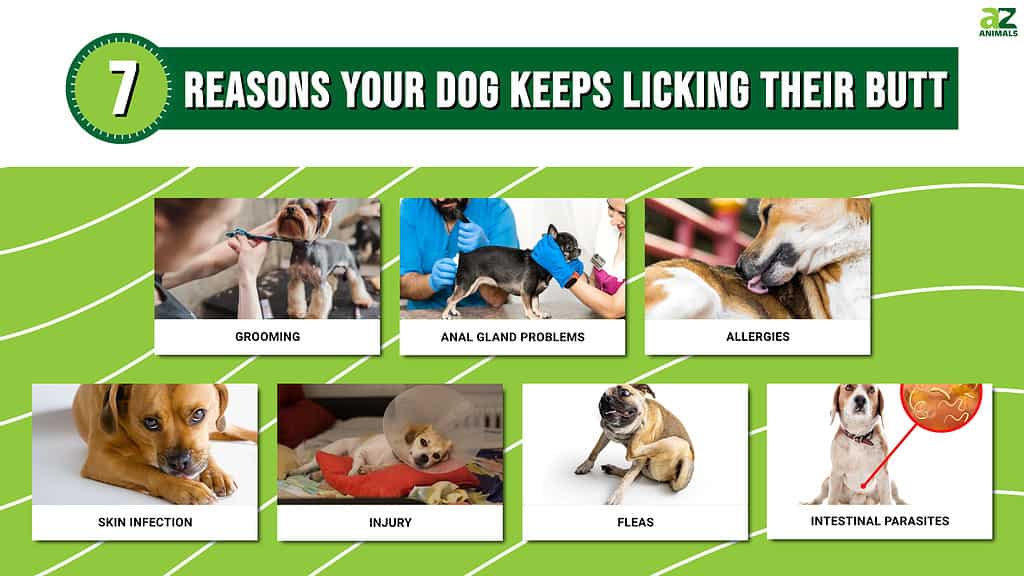
Below, we’ll go over seven reasons your dog keeps licking their butt and what to do about it.
1. Grooming
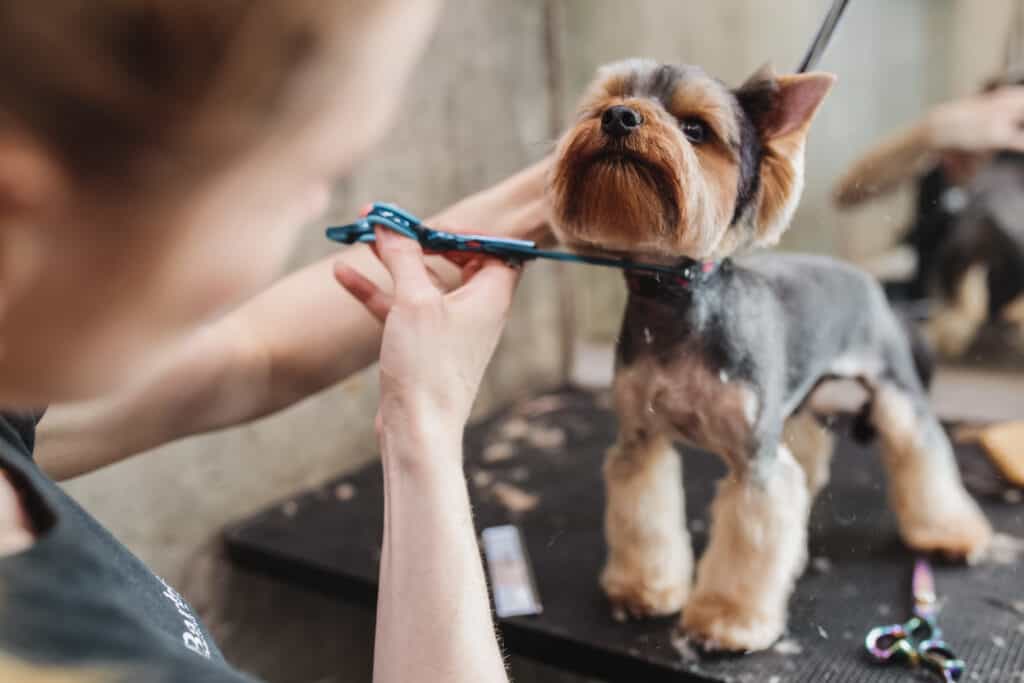
A groomer can help clip the fur near your dog’s butt to keep his hindquarters tidy and reduce the need for licking.
©Rovsky/Shutterstock.com
Dogs are constantly licking themselves to stay clean. It’s how they groom themselves, including their butts.
Your dog licking their butt occasionally is normal. It might even seem prolonged, especially if you’re feeling grossed out!
Sometimes dogs do need help grooming, so it’s a good idea to check your dog’s butt regularly and ensure it’s clean. You can use a pet-friendly wipe, we’ve even reviewed a few here.
Long-haired dogs get poop and other debris stuck in their fur. Having your groomer give them a sanitary shave can help prevent this from happening.
2. Anal Gland Problems
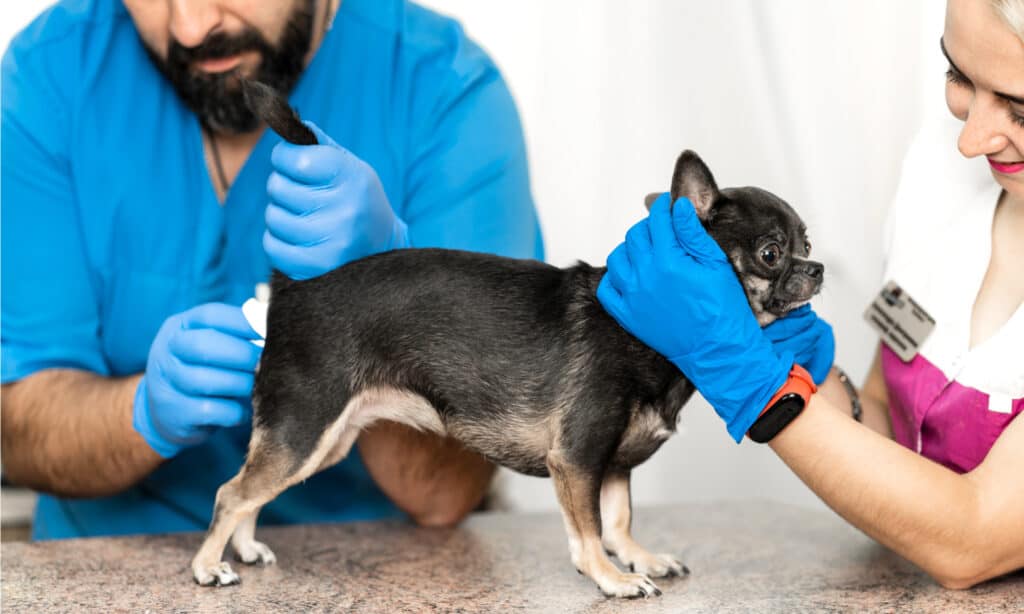
Anal gland impaction can cause your dog to lick their butt frequently.
©Try_my_best/Shutterstock.com
Anal gland impaction or infection can cause dogs to lick their butts excessively. This can be due to itchiness, pain, discomfort, or trying to get themselves clean.
A dog’s anal glands typically become impacted due to swelling in the area. Impaction can create a breeding ground for bacteria, which can then cause abscesses and infection.
Symptoms of anal gland issues include:
- Scooting their butt across the floor
- Licking or biting the base of the tail
- Pus or blood around the anus or in the feces
- Pain
- Difficulty pooping
- Aggression occurs when the anal area or tail is touched
Problems with the anal gland are especially common in small dogs, but any dog can have impacted or infected anal glands.
Typical treatments include manually expressing the anal glands, antibiotics to treat infections and pain relief medication. If your dog is in a lot of pain when the anus is touched, your vet might recommend sedating them before treatment.
The veterinarian-recommended, patented formula made in the USA with all-natural ingredients, ensuring your pet's digestive health and supporting healthy anal glands while guaranteeing relief from the "Scoot" in just 3-5 weeks!
3. Allergies
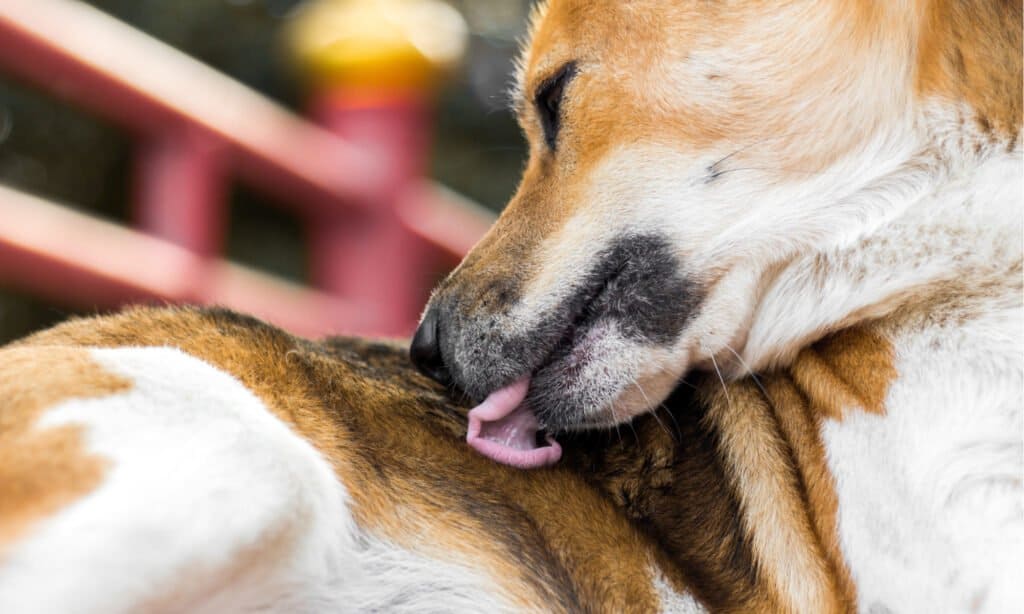
Allergies can make your dog miserable and cause them to lick the itchy areas.
©Rattanapon Ninlapoom/Shutterstock.com
Allergies can make your dog itchy, even around their anal area. Dogs can have specific allergies that are easy to avoid, like certain foods, or environmental allergies that are more difficult to treat, just like people.
The most common symptoms are itchiness and digestive problems. Your veterinarian can diagnose your dog by observing their symptoms and performing skin allergen tests or blood tests.
Treatments include anti-inflammatory medications, soothing shampoo, allergy injections, and dietary changes. Your vet will also advise avoiding your dog’s allergy triggers whenever possible, although this can be difficult or impossible with environmental allergens.
4. Skin Infection
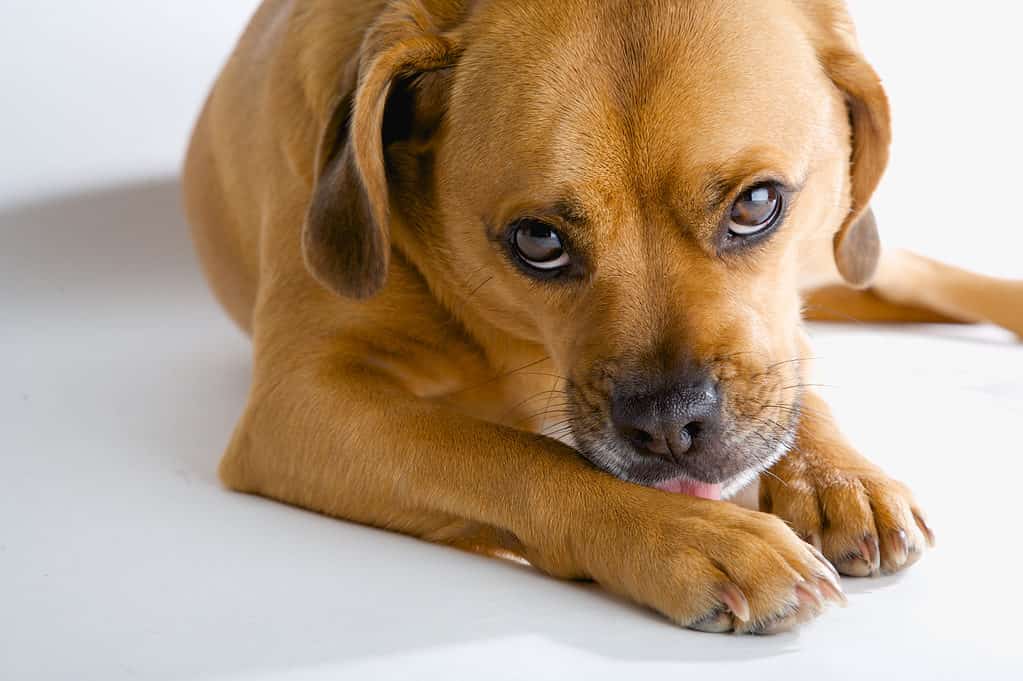
if your dog is injured around the anal skin area, it may cause itchiness and pain, which leads to excessive licking.
©iStock.com/shotbychatty
Skin infections around the butt are most common if your dog is injured in that area. Urine and feces can make it dirtier down there and thus more prone to infection.
Dogs will lick to soothe itchiness or pain, often making the problem worse.
Symptoms of skin infections in dogs include:
- Thickened skin
- Dry, crusty skin
- Redness
- Inflammation
- Itchiness
- Pain
- Musty odor
- Dark patches of skin
- Fur loss
- Moist skin
- Sores
Your veterinarian can typically diagnose a skin infection by looking at the area. In some cases, they might take samples or cultures for further study.
Treatments for skin infections include oral antibiotics, creams for the affected skin, and antibacterial shampoo.
5. Injury
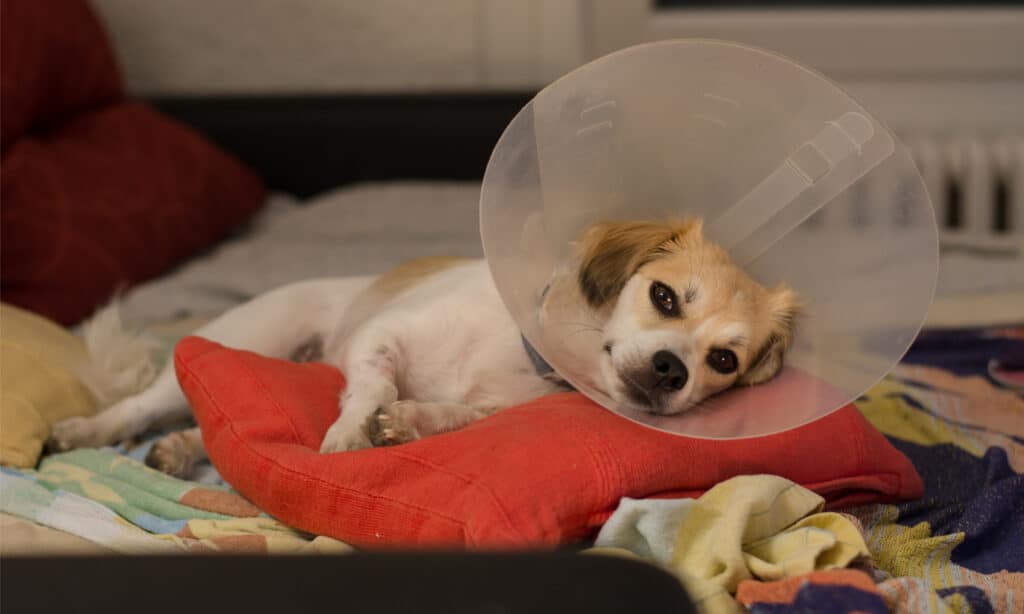
If your dog has a cut or other wound around their butt, your vet may treat it and use an e-collar to protect the area.
©iStock.com/Daniel Besic
Dogs will also lick themselves in areas that hurt, so it’s possible your dog has an injury around their butt. This might be a cut, bruising, or another wound that’s irritating them.
To check, you might need one person to distract your dog while the other walks behind them. Be careful when touching the area, as it might already hurt.
If you notice an injury, it’s likely best to call your veterinarian. As we discussed above, your dog’s butt isn’t a very clean place. Especially if the injury is near the anus, it’s likely to be exposed to feces.
Your veterinarian will likely proactively prescribe antibiotics, or they might recommend simply keeping an eye on the area instead. Be sure to watch for signs of infection, listed above. If you notice an infection, get to the vet quickly for treatment.
6. Fleas
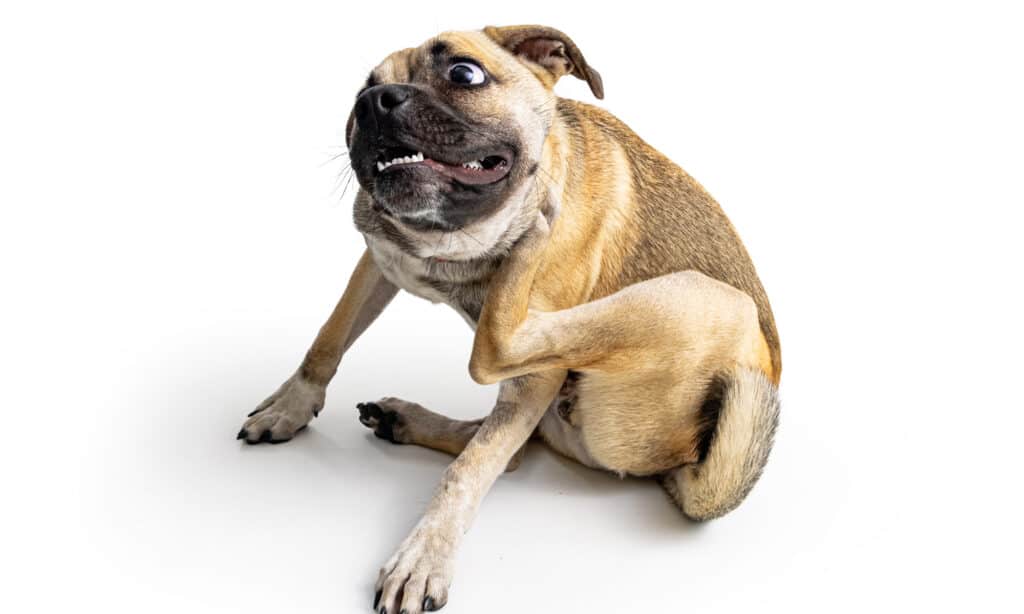
Fleas can cause extremely itchy skin in your dog, including in the anal area.
©iStock.com/adogslifephoto
Flea bites are incredibly itchy! If your dog has fleas and is licking their butt, they might have been bitten there or the fleas have gathered in that area.
Symptoms of fleas include itchiness, hair loss, scabs, redness, and inflammation. You may see the fleas themselves–small black or brown insects that are easy to spot but may hide deep in the fur.
Another thing to look for is “flea dirt” which are the black pepper-like droppings the fleas leave on a dog.
Treatment of fleas includes a flea bath with dog-safe shampoo and prescription parasite prevention medication. Your dog should be on parasite preventative year-round to keep fleas from returning in the future.
You’ll likely also have to clean your home thoroughly to remove not only the fleas themselves, but their eggs.
Avoid home remedies and don’t wash your dog with dish soap unless you’re in a pinch. It can dry out your dog’s skin and coat, but likely won’t harm them with one use if need be.
7. Intestinal Parasites
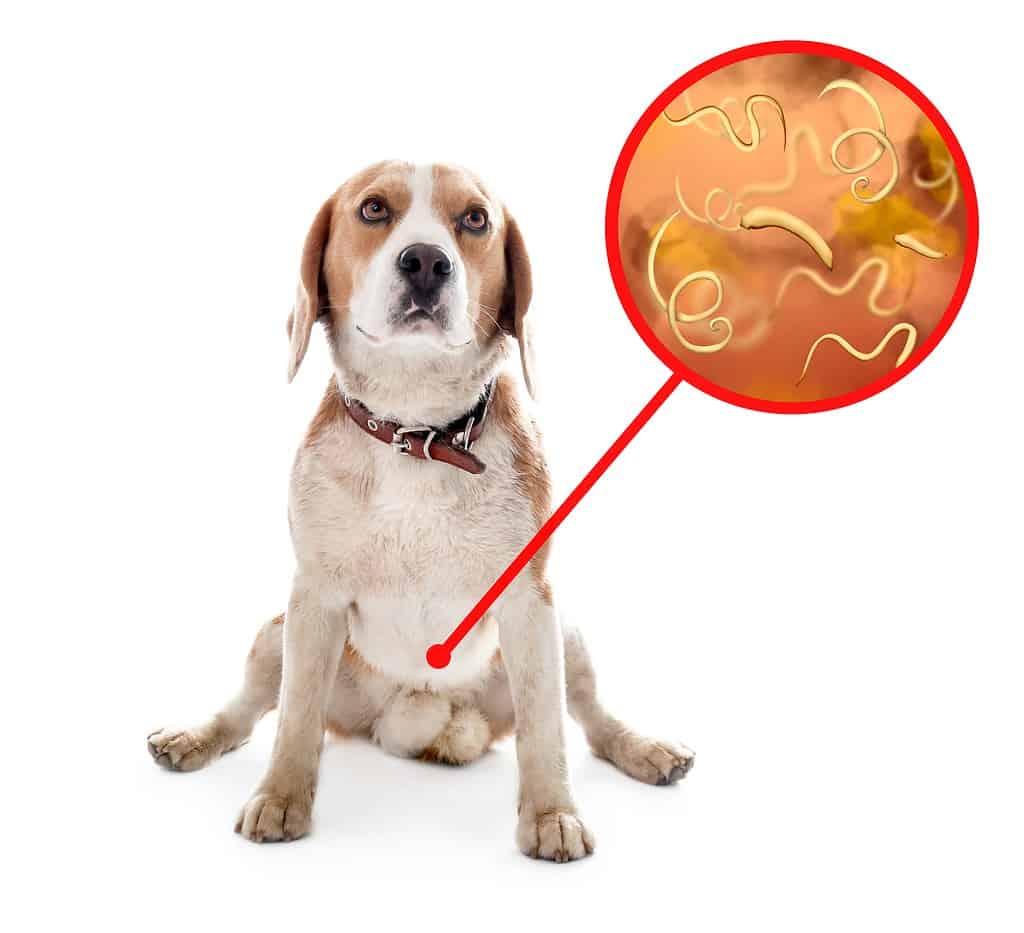
Parasites like tapeworms and roundworms can cause your dog to have an itchy behind.
©New Africa/Shutterstock.com
Intestinal parasites like tapeworms, hookworms, whipworms, or roundworms can also cause your dog to itch their butt. These parasites live in your dog’s digestive tract.
Sometimes, you can see evidence of worms in your dog’s poop. However, dogs can have a serious infestation and not have visible worms in their feces.
Diagnosis at the vet typically consists of a stool sample, which will be studied under a microscope for signs of parasites. This should be performed by your veterinarian every six months if your dog is healthy, but can be done again if you notice symptoms like itchiness.
Treatment consists of deworming medications and treating any underlying causes, such as fleas, to prevent re-infestation.
Should You Stop Your Dog From Licking Its Butt?
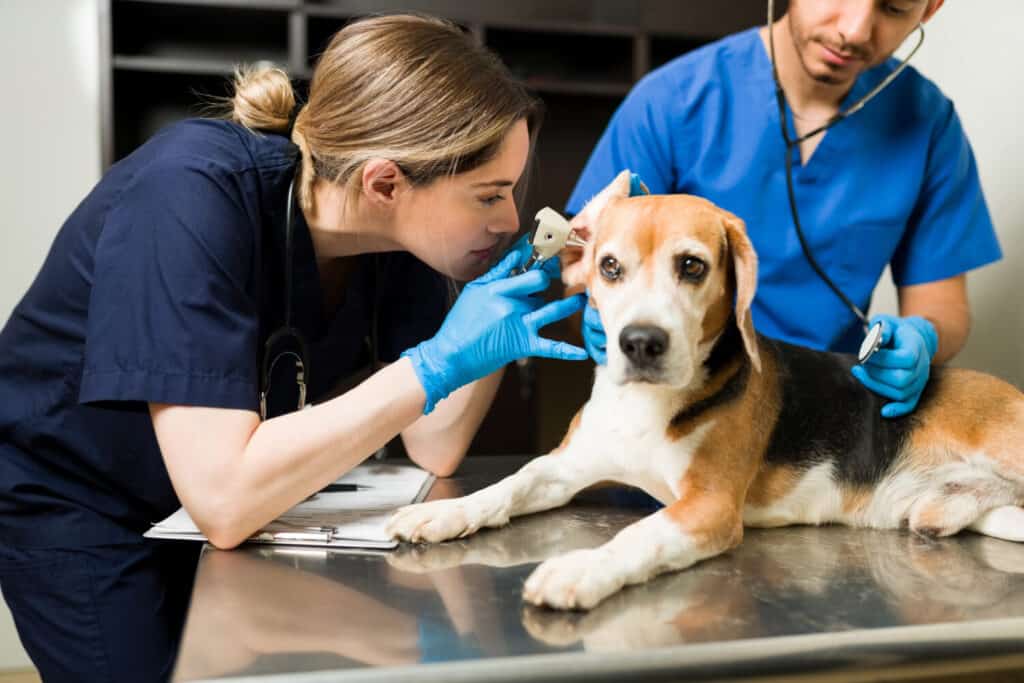
Your dog’s vet can help ease the symptoms and treat the cause of your dog’s butt licking.
©Beach Creatives/Shutterstock.com
Normally, you don’t want to prevent your dog from licking its butt. Although it seems gross to us, it’s their way of cleaning themselves.
Preventing your dog from licking altogether takes away a natural, instinctive behavior from them. They’ll also be quite dirty down there! If your dog didn’t lick their butt, you’d need to clean it every time they pooped.
However, dogs also lick to itch. In small amounts this is fine, but just like with humans, itching can make skin problems worse. If your dog has a medical issue, they might need to be stopped from licking so that they don’t irritate the skin further or hurt themselves.
The first step is to bring them to the veterinarian to treat them for whatever’s causing the licking. Your vet can also advise you on how to prevent excessive licking.
They may advise an Elizabethian collar, also known as “the cone of shame.” More people are using alternatives like donut collars or clothing to cover the area like a onesie. These tend to be less stressful for dogs as they don’t hinder their natural movements as much.
Bandaging the area, such as your dog’s tail, isn’t recommended unless you’re instructed otherwise by your veterinarian. It can be easy to bandage an area too tight and cut off your dog’s blood flow, causing an even bigger problem than you started with.
Now that you know the seven causes of your dog licking its butt, we hope you have some clarity. Remember that some licking is normal, but obsessive licking warrants a vet appointment pronto!
Summary of the 7 Reasons Your Dog Keeps Licking Its Butt
Here’s a summary of the 7 reasons your dog keeps licking its butt and some ways you can help them with the issue:
| Number | Reason | Remedy |
|---|---|---|
| 1 | Grooming | Pet-friendly wipe or sanitary shave |
| 2 | Anal Gland Problems | Manually expressing, antibiotics, pain relief medication |
| 3 | Allergies | Anti-inflammatory medications, soothing shampoo, allergy injections, dietary changes |
| 4 | Skin Infections | Oral antibiotics, creams for the affected skin, antibacterial shampoo |
| 5 | Injury | Keep an eye on the area, antibiotics, seeing a vet |
| 6 | Fleas | Flea bath with dog-safe shampoo, prescription parasite prevention medication, eradicate whole house |
| 7 | Intestinal Parasites | Deworming medications, treat any underlying causes |
The photo featured at the top of this post is © Rattanapon Ninlapoom/Shutterstock.com
Ready to discover the top 10 cutest dog breeds in the entire world?
How about the fastest dogs, the largest dogs and those that are -- quite frankly -- just the kindest dogs on the planet? Each day, AZ Animals sends out lists just like this to our thousands of email subscribers. And the best part? It's FREE. Join today by entering your email below.
Thank you for reading! Have some feedback for us? Contact the AZ Animals editorial team.







